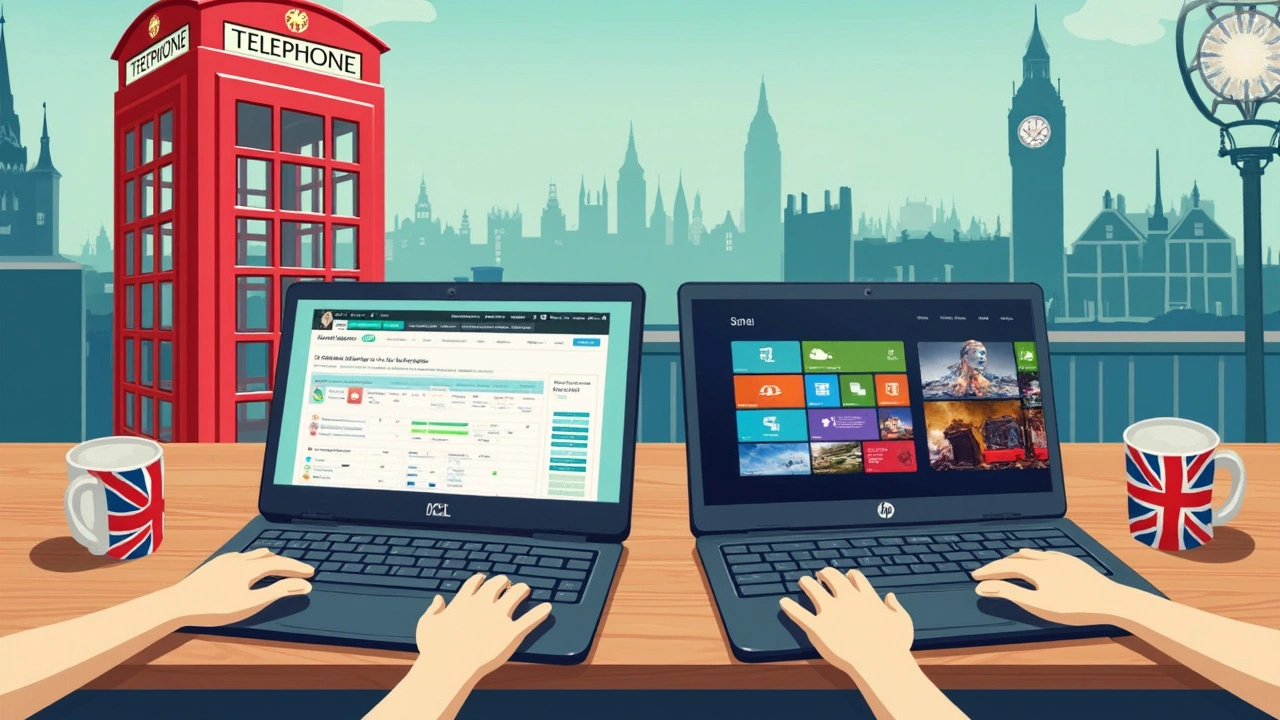Trying to pick between Dell and HP? You’re not alone. These two brands have been locking horns for years, each with their loyal fans. But just because your buddy swears by his Dell doesn’t mean it’s perfect for everyone. Or that HP hasn’t come out swinging with new stuff.
Before you throw down your hard-earned cash, it's smart to look past flashy ads and dig into what actually matters: things like how long these laptops last, how they stand up to daily knocks and spills, and if the specs match up with what you do—be that gaming, work, or streaming shows on the couch. Price is just one piece of the puzzle. The support you get when something goes wrong (and trust me, it happens) can make or break your experience.
HP and Dell both crank out everything from student laptops to powerhouse business machines. But each does things a little differently. Curious which one nails it for your needs? Let’s break down the real differences so you don’t end up stuck with a laptop you regret.
- Build Quality and Reliability
- Performance and Specs
- Design and Features
- Customer Support and Warranty
- Value for Money: Who Wins?
Build Quality and Reliability
It’s wild how much a laptop’s build matters after a few months on the go. Both Dell and HP know people toss their laptops in backpacks and use them in all sorts of places. But let’s face it—some models hold up way better than others.
For build quality, Dell’s XPS lineup stands out fast. The XPS 13 and XPS 15 have sturdy aluminum bodies and Gorilla Glass screens that shrug off scratches. The hinges don’t get wobbly after a year, which was a problem on older models. Dell Latitude—aimed at business folks—uses magnesium alloy for extra toughness. These are the laptops you see rumbling around airports with road warriors. Even the average Inspiron is tougher than most expect at its price.
HP’s high-end Spectre and EliteBook lines fire right back. The Spectre x360 is famous for its solid metal design and plenty of reviewers have dropped them (on carpets, thankfully) without drama. HP has even tested its EliteBooks against drops, spills, and dust—their spec sheets brag about military-grade durability. Basically, you can spill some coffee and not panic instantly (just don’t try it on purpose).
If you buy a cheaper HP, like the Pavilion series, you’ll notice the difference. There’s more plastic and some flex near the keyboard, but that’s common for budget laptops under any brand. Dell’s budget models, like the Inspiron, can have a bit less flex, but it's not a night-and-day difference. Just don't expect a tank for $500.
Reliability? Here’s where numbers help. Independent surveys in 2023 from Rescuecom and SquareTrade put Dell just slightly ahead of HP in long-term repair rates. That means fewer users needed major fixes in the first three years with Dell. But HP isn’t far behind—it’s not a landslide. Both offer optional on-site repairs for business models if you hate waiting forever for tech help.
| Brand | 3-Year Repair Rate | Notable Strong Models |
|---|---|---|
| Dell | 11% | XPS, Latitude |
| HP | 13% | Spectre, EliteBook |
In short, if you want next-level build, look for Dell’s XPS or HP’s Spectre and EliteBook series. Cheap models from either side show more wear, but that’s what you get for the price. For sheer toughness and fewer repairs, Dell’s numbers are slightly better, but not enough to make HP a risky bet.
Performance and Specs
This is where things get interesting, especially if you care about speed and what’s under the hood. Both Dell and HP have models with the latest Intel Core and AMD Ryzen chips, so you’re not locked out of anything modern. If you plan to run demanding stuff like video editing software, gaming, or heavy multitasking, pay close attention to which processors and how much RAM each laptop packs. Laptops with at least 16GB of RAM and an SSD fly through most tasks. Both brands offer this even in their mid-range models these days.
A cool fact: Dell’s XPS series often gets hyped for pushing the envelope on performance. You’ll find XPS 13 and 15 laptops that squeeze a ton of power into a slim build—think 12th or 13th Gen Intel chips, plenty of RAM options, and even decent graphics for creative workloads. HP fights back with its Spectre and Envy lines, which in recent years started using similar hardware, so you won’t be missing out on horsepower. The two square off pretty evenly for raw specs, though the XPS line takes a slight lead if you’re chasing the most cutting-edge parts.
If you’re shopping for gaming, Dell leans into its Alienware series, while HP pushes its Omen lineup. Both feature high-refresh screens and the latest NVIDIA RTX cards. The difference? Alienware usually feels a bit pricier, but diehard gamers rave about its thermal control and customizable lighting. Omen sometimes comes in at a lower price for similar specs, which can be tempting if you’re budget-minded.
| Series | Flagship Processor | Max RAM | Storage Type |
|---|---|---|---|
| Dell XPS 13 | Intel Core i7-1360P | 32GB | NVMe SSD |
| HP Spectre x360 14 | Intel Core i7-1355U | 32GB | NVMe SSD |
| Alienware m16 | Intel Core i9-14900HX | 64GB | NVMe SSD |
| HP Omen 16 | AMD Ryzen 9 7940HS | 32GB | NVMe SSD |
Don’t forget about battery life. HP’s recent Spectre ultrabooks tend to squeeze out an extra hour or two over similar Dells, thanks to smart optimization. That said, anything with a big high-res screen or beefy graphics (think gaming rigs) will chew through battery fast, so it really comes down to what you need most: all-day work or raw power.
One last thing to check? Ports. Dell usually goes heavy on USB-C and Thunderbolt ports in its premium models, sometimes at the cost of traditional USB-A. HP tends to keep a mix, so if you have older accessories you won’t need extra dongles. Always check the specs closely to avoid surprises.

Design and Features
Let’s talk about what you actually see and feel every day: looks and features. Both Dell and HP really put in effort on design over the last few years, and you can spot the difference the second you open the lid.
Dell is pretty famous for its XPS line. The XPS 13, for example, has won awards for its clean, almost borderless display. The aluminum finish feels high-end, and those carbon fiber palm rests? Super comfy. Dell’s laptops are also known for being slim without turning into a flexy mess. Most have a beefy hinge and the keyboard deck barely gives at all. That’s something you notice if you do a lot of typing.
HP doesn’t slack on looks either. The Spectre x360 is a stunner, with those sharp angles and gem-cut edges. You’re getting a convertible laptop that snaps into tablet mode. That’s a win for creatives or anyone who likes to doodle or write with a pen. HP’s laptops tend to be a touch lighter than Dell’s, which you’ll appreciate if you carry your device everywhere.
Both brands offer wide color options and screen sizes, from compact 13-inch ultrabooks to chunky 17-inch powerhouses. Here’s a quick comparison for some popular models and their standout features:
| Brand / Model | Main Feature | Weight (approx) | Ports |
|---|---|---|---|
| Dell XPS 13 | InfinityEdge display, solid build | 2.7 lbs | 2x Thunderbolt, 1x USB-C, microSD |
| HP Spectre x360 14 | Convertible, stylus support | 2.95 lbs | 2x Thunderbolt, 1x USB-A, microSD |
When it comes to features, HP loves throwing bundled extras into the mix. Many HP laptops come with a privacy shutter over the webcam, fingerprint readers, and mute buttons for your mic—handy stuff if you take calls or travel a lot. Some models are also loaded with OLED displays, which really pop for color and contrast.
Dell doesn’t skimp either, especially on display quality. Plenty of their best laptops rock 4K panels, and the XPS line was one of the first with that super thin bezel look. Most current models also offer a fingerprint scanner and Windows Hello face unlock for quick logins. One quirk: Dell tends to go minimal on ports, especially on their XPS lineup, while HP keeps a better mix with USB-A for your old devices.
One last thing—if you’re all about sound, HP usually edges out Dell, thanks to its speakers tuned by Bang & Olufsen. Not going to turn your laptop into a club, but playlists and streaming do sound surprisingly good.
So if you want a sleek, solid machine with an almost invisible screen border? Dell is probably your move. If you want more flexibility, stylus support, lighter carry weight, and a few extra features for privacy and comfort, HP takes the cake. It all depends on what you notice and use the most day to day.
Customer Support and Warranty
Customer service isn’t the sexiest thing when you’re buying a new laptop, but it matters more than you might think. Both Dell and HP push hard to win customers with their support services, though they don’t exactly do things the same way.
Dell is famous for its “ProSupport” packages, especially for business customers. You can get 24/7 support, onsite repairs, and even accidental damage protection (for a fee). One cool thing: Dell’s website lets you pull up warranty status, order parts, and get driver updates fast. Many folks report quick answers over chat and phone—even on weekends. Dell also has a decent self-help portal if you’re more of a DIY troubleshooter.
HP, on the other hand, offers solid support too. Their “Care Packs” extend warranties and add accidental damage coverage, similar to Dell. Some of their lines come with 24/7 phone or chat help, like HP Spectre and EliteBook. HP’s service quality can vary depending on where you live, though—in the U.S. and Europe, it’s pretty solid. They also provide device pick-up service for repairs, which can be a big stress-reliever if you’d rather not leave the house.
| Brand | Warranty (Standard) | Extended Options | 24/7 Support |
|---|---|---|---|
| Dell | 1 year | ProSupport, Accidental Damage | Yes (with ProSupport) |
| HP | 1 year | Care Packs, Accidental Damage | Yes (on select models) |
Quick heads-up: If you travel a lot, Dell tends to have a slight edge. Their international warranty support is wider. But for the average user, both brands have apps and sites for tracking service requests and checking warranty info.
If you care about being able to call someone for help, both brands deliver, but it’s usually smoother (and faster) if you buy premium support plans. For basic help, expect decent—but not flawless—service from each. Save your service receipts and register your laptop online right after your purchase. That simple move can shave days off your claim time if something goes sideways.

Value for Money: Who Wins?
When you’re looking at best laptop brands like Dell and HP, your wallet usually has the final say. The real question: who gives you more bang for your buck? Let’s lay it out clearly.
HP is usually the go-to if you’re on a tighter budget. Their entry-level models, especially the Pavilion and 14/15 lines, often cost less for similar hardware. For students or anyone just needing web browsing, office work, and streaming, HP’s lower prices can be a real deal. But you might notice cheaper plastic builds or screens that aren't quite as punchy.
Dell, on the flip side, sometimes charges a bit more, but you usually see where that extra cash goes. Even their more affordable Inspiron series has solid design and decent customer support. Dell’s mid-range and high-end models, like the XPS and Latitude series, come with top-notch screens, better materials, and longer warranties—and those little details count if you’re planning to keep your laptop for a few years.
If you’re eyeing gaming or pro performance, check out Dell’s Alienware versus HP’s Omen line. Price-wise, they're similar at launch, but Dell’s Alienware often keeps its value longer if you plan to resell.
Here’s how typical prices match up for similar popular models as of May 2025:
| Model | Price (USD) | Key Features |
|---|---|---|
| HP Pavilion 15 | $590 | i5, 8GB RAM, 512GB SSD |
| Dell Inspiron 15 | $650 | i5, 8GB RAM, 512GB SSD |
| HP Spectre x360 | $1250 | i7, 16GB RAM, 1TB SSD |
| Dell XPS 13 | $1350 | i7, 16GB RAM, 1TB SSD |
The difference isn’t massive, but it’s there. If you want absolute savings, HP’s a safe bet. But if you care about durability, display quality, or plan to use your laptop hard, Dell often comes out on top in the long run.
- If future resale value and warranty matter, go Dell.
- If upfront price is the main thing, HP usually wins.
- If you need a gaming machine, look at deals—sometimes HP’s Omen can be cheaper for the same specs, but Dell’s Alienware might last longer.
Shop around, hunt discounts (student, trade-in, or seasonal deals), and always check reviews for the exact model, since prices can swing fast.

